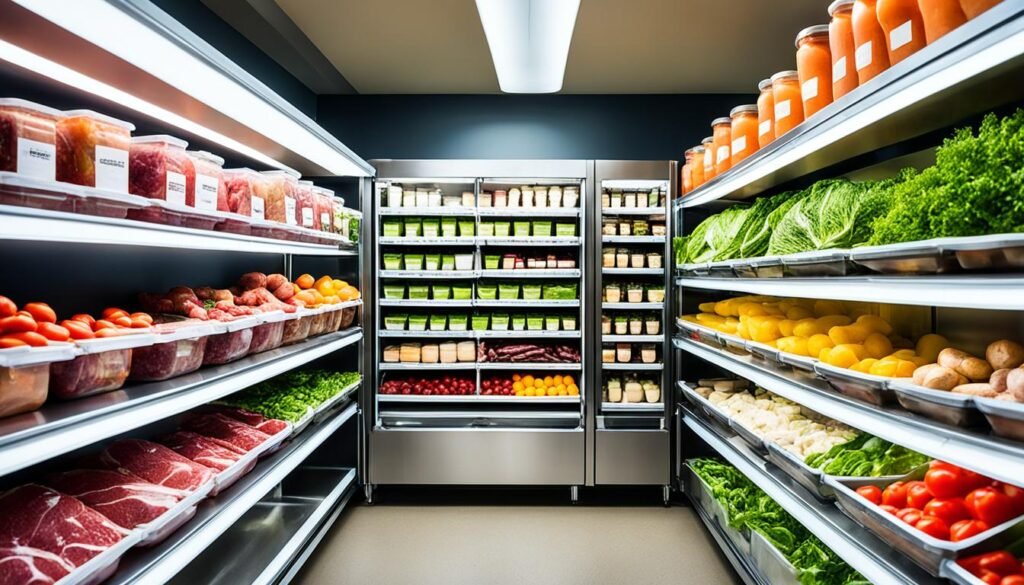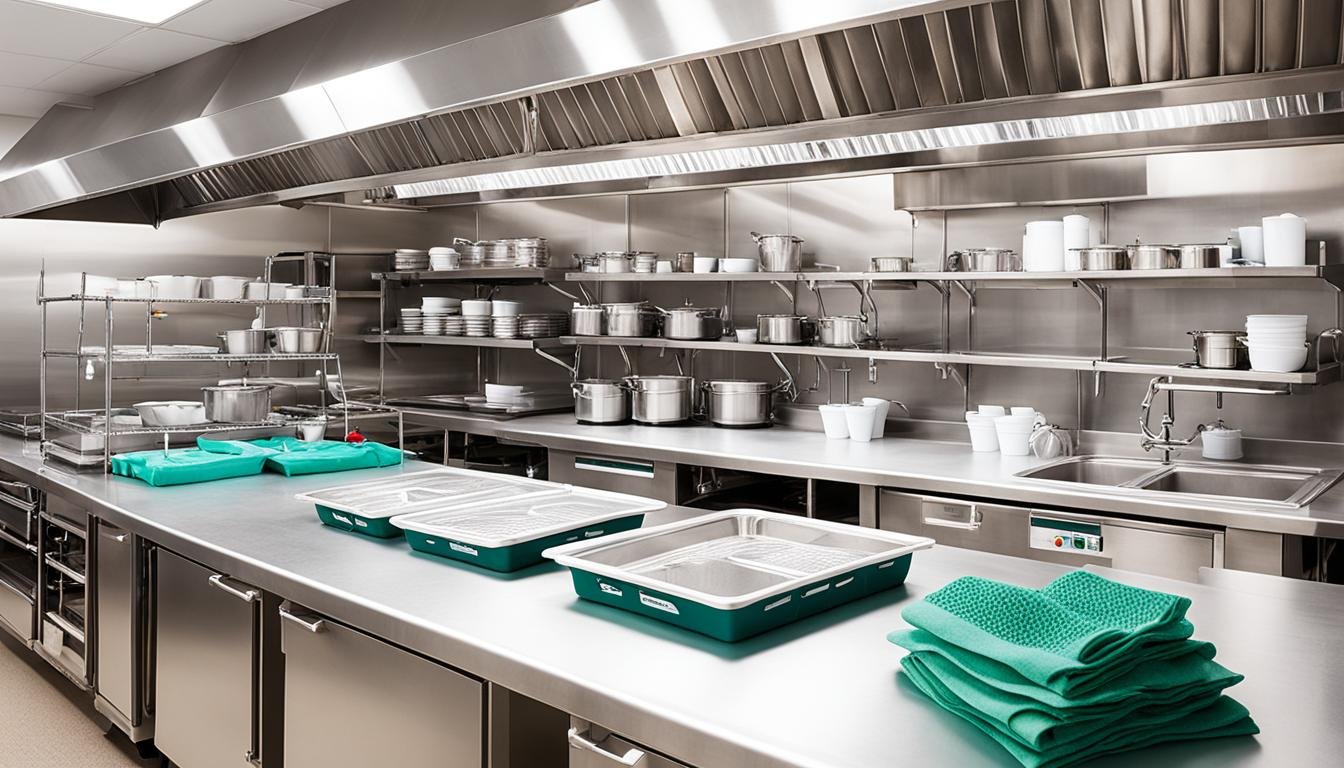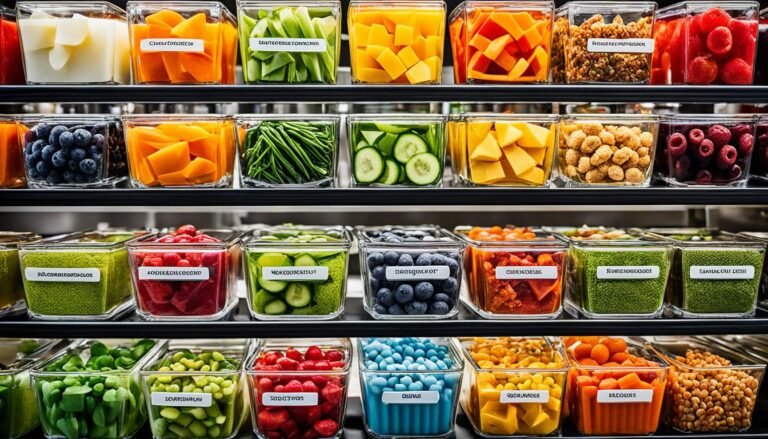Mastering Food Safety and Hygiene in Hospitality
Imagine stepping into a cozy restaurant, drawn by the delicious smells in the air. You sit down, looking forward to a great meal. The clean environment, from the tables to the kitchen you can see, marks the start of a wonderful experience.
This scene highlights how critical food safety and hygiene are in the hospitality industry. Restaurants and hotels must follow strict rules to keep guests safe and happy. A clean, safe kitchen means customers trust the food, leading to a successful business. This is why food safety is essential across the hospitality sector.
Key Takeaways
- Food safety and hygiene are crucial in the hospitality industry.
- Best practices, regulations, and guidelines maintain customer trust and regulatory compliance.
- Proper training and compliance foster a culture of safety and enhance employee morale.
- Food safety certification is constantly evolving to adapt to new challenges and innovations.
- Investing in food safety and hygiene ensures a safe and enjoyable dining experience, protects the reputation of establishments, and fosters customer loyalty.
The Importance of Food Safety Certification
Food safety certification matters a lot. It builds trust by showing customers that a place meets high hygiene standards. This confidence boosts business, as people are more likely to eat at certified spots, feeling safe.
Being certified means following strict health rules. It’s about keeping the public safe. Places with certifications prove they’re serious about safety, aiming to create a secure eating place for all.
Food safety certification fights food infections. It teaches how to handle food safely, avoiding sickness. This keeps customers healthy and the business’s name clean, making everyone happy.
Getting certified also means training staff in food safety. This makes everyone at a place skilled in preventing dangers. So, customers can enjoy meals without worry. Plus, it sharpens the team’s abilities, keeping standards high always.
The Real-World Impact of Food Safety Certification
Big outbreaks of foodborne illnesses have recently made news. These stories show what can happen if food safety isn’t taken seriously. They underline how essential it is to have strong measures in place.
“Foodborne illnesses can have devastating effects on customers and businesses alike. They not only pose a risk to public health but also tarnish the reputation of the establishment responsible.”
Businesses that make food safety a top priority do well. They keep their customers happy and build a good name. This shows just how valuable it is to have the right certifications. It shows you care about safety.
Today, customers care a lot about what they eat and where it comes from. Having the right certifications can set a business apart. It makes customers trust you more. This leads to more business and less worry about getting sick.
Being certified doesn’t just help with your image. It keeps customers coming back. They trust you with their health. This trust builds loyalty and makes your business stronger over time.
Reaping the Benefits of Food Safety Certification
Fully certified businesses enjoy many positive outcomes:
- They are seen as safe and trustworthy, leading to a better image.
- People keep coming back because they know these places care about their safety.
- Strict safety standards help the whole community see these businesses in a good light.
- Certification means the business follows the law, avoiding fines and legal trouble.
- By reducing the chances of getting sick, businesses protect both customers and themselves.
Certifications show you’re serious about safety. They help keep customers happy and make your business stronger. This investment in safety also boosts your reputation.
The Significance of Food Safety in Hotel Kitchens
Food safety is critical in hotel kitchens. It keeps guests safe and maintains the hotel’s good name. Kitchens follow strict rules to prevent sickness from food, keeping meals enjoyable for all.
Handling food correctly is key to safety. This means washing hands, cleaning surfaces, and managing food properly. Kitchens also focus on storing food and controlling temperatures to stop bacteria and keep ingredients fresh.
Following these safety rules avoids guest sickness and legal problems for hotels. It helps them win the trust of their customers by showing they care about safety while dining.
Why Food Safety in Hotel Kitchens Matters
Food safety in hotel kitchens is vital for protecting the health of guests and maintaining a positive reputation in the industry. By following regulations and guidelines, hotels can prevent cross-contamination, food spoilage, and the spread of foodborne illnesses.
The Role of Regulations and Guidelines
Regulations and guidelines are the backbone of food safety in hotels. They include how to handle, store, and clean food. Following these helps hotels make a safe place to prepare meals.
The Importance of Training and Education
Training staff is vital for keeping up food safety. Hotels give kitchen workers lessons on how to handle food safely. They also have to keep learning new safety tips to stay sharp.
Food safety is a must in hotel kitchens. It keeps guests healthy and the hotel respected. Following rules, teaching staff well, and always improving is how hotels succeed at making food safe.
Understanding Food Safety Regulations in Hotel Kitchens
Hotel kitchens are vital for keeping food safe for guests. They follow many food safety rules. These rules help with storing food right, controlling temperatures, keeping equipment clean, and making sure staff is clean too.
It’s crucial for hotel kitchens to store food correctly. This keeps food fresh and safe. They use proper labels and keep food items apart to stop bad bacteria from spreading.
Controlling temperatures is key in these kitchens. The right temps keep bacteria away. Kitchens regularly check equipment and handle food carefully to avoid sickness.
“Adhering to food safety regulations is not only necessary for guest safety but also crucial to avoid legal issues or closure of the kitchen.”
Cleaning equipment is a big part of the rules. Kitchens must stay on top of it. They clean, sanitize, and check equipment to prevent bacteria.
Staff hygiene is also very important. Kitchens teach their staff to be clean. This includes proper handwashing, wearing the right clothes, and not doing anything that might make food dirty.
Kitchens get checked often by health inspectors. This helps keep them on track. The goal is to always meet the highest food safety standards for happy guests.
Following food safety rules makes hotel kitchens safe and clean. It means guests can trust the food is good. And it keeps the hotel’s good name too.
| Food Safety Regulations | Key Areas Covered |
|---|---|
| Food Storage | Proper labeling, refrigeration, and separation of different food items |
| Temperature Control | Maintaining the right temperatures during food preparation, cooking, and storage |
| Equipment Sanitation | Cleaning, sanitization, and maintenance of kitchen equipment and utensils |
| Staff Hygiene | Training and education on personal hygiene practices for kitchen staff |
It’s crucial for hotel kitchens to meet food safety regulations. This ensures guests have a great dining experience. It also helps maintain the trust and loyalty of the hotel’s customers.
Best Practices for Food Safety in Hotel Kitchens
Keeping food safe in hotel kitchens is a serious job. They must follow the best practices to make sure their food doesn’t make guests sick. We will look into the key methods every hotel kitchen should use.
1. Handwashing
Handwashing is crucial for stopping the spread of bad germs. Every staff member needs to wash their hands well. They should use soap and warm water for 20 seconds. This is needed before and after they touch food, use the bathroom, or handle anything dirty.
2. Surface Cleaning and Sanitization
Regular cleaning and sanitizing kitchen areas helps prevent germ spread. Countertops, cutting boards, and tools must be kept clean. A strict cleaning routine ensures all areas are sanitized often.
3. Separating Raw and Cooked Foods
Raw and cooked foods should always be kept apart. This stops bacteria from moving between them. Use different tools and areas for raw and cooked foods to ensure safety.
4. Temperature Control
Right temperatures are key to avoid harmful bacteria in food. Fridges and freezers should be cold enough. Keep hot foods really hot and cold foods very cold to kill off germs.
By sticking to these practices, hotel kitchens can keep their food safe. This protects guests’ health and makes their meals worry-free.
Source:
National Restaurant Association. (2021, October 22). Food Safety Certification. Retrieved from https://www.restaurant.org/restaurant-careers/food-safety
The Role of Certified Food Handlers in Food Safety
Certified food handlers are key in keeping food safe in hotel kitchens. They make sure food is handled and stored correctly. This helps prevent sickness and keeps the kitchen safe.
These workers get special training. They learn about safe food prep, stopping the spread of germs, and controlling temperatures. This knowledge keeps food safe from the kitchen to the table.
With certified handlers, everyone feels more secure. Their presence shows the team values food safety. And customers know they’re in good hands. This trust is very important in the food industry.
The Benefits of Certified Food Handlers:
- Safe food preparation: Certified handlers reduce the chance of food making you sick.
- Sanitation and hygiene: They keep the kitchen clean, knowing it’s vital for safety.
- Prevention of cross-contamination: They keep foods from mixing, preventing sickness.
- Compliance with regulations: They ensure the kitchen meets legal food safety standards.
- Enhanced reputation: Having them shows customers you care about their health. It builds trust and makes people recommend your place to others.
Investing in these experts pays off. It means that kitchens run safely all the time. And this leads to a great reputation.
Now, we’ll see how managers and owners keep up food safety. This is important for a safe and enjoyable dining experience.
The Role of Management in Food Safety
Good management in restaurants is key for keeping food safe. Managers lead by example. They ensure their team knows and follows food safety rules. With training and the right tech, they make sure everyone works towards food safety.
Building a Skilled Team
Managers look for team members who care about food safety. They pick people who already know a lot about it. Or, they choose ones ready to learn on the job. This builds a team that takes food safety seriously.
Training and Education
Managers need to teach their staff about food safety. They keep everyone up to date on the latest rules. This makes sure workers know how to handle food safely. It stops them from mixing food in a way that could make someone sick.
“Food safety is a team effort, and it starts with the commitment and leadership of the management. By prioritizing food safety, we create a culture that ensures our customers’ well-being and builds trust in our brand.”
Utilizing Technology
Using technology can help keep food safe. Managers can use tools to watch food supplies and storage. These tools make work easier, cut mistakes, and help solve problems fast. This keeps the food safe for customers.
Culture of Food Safety
Good management creates a culture that values food safety. By always talking about its importance and showing how to keep food safe, managers make sure their team focuses on this. This approach runs through the whole restaurant, making it a safe place to eat.
Summary
Running a restaurant well means making food safety a top priority. By picking a great team, ensuring they are well trained, using technology, and setting a culture of safety, managers protect customers and do well. They follow safety rules and make their restaurant a trusted place.
The Importance of Food Safety and Hygiene for Restaurants
Keeping food safe and clean is key for restaurants. This protects people’s health and builds trust with customers. If a restaurant doesn’t focus on this, it can lead to sickness, bad reviews, and lost trust.
For a great dining experience, food safety and hygiene are a must. A clean place not only keeps people healthy but also makes them feel confident. This confidence brings customers back, which is great for a restaurant.
Good food safety practices help manage a restaurant’s image. If there’s a health scare, people will avoid the place. But, a good image brings more customers, thanks to trust and professionalism.
To stay open, restaurants must meet health laws. These laws cover how food is handled and stored, and the place’s cleanliness. Following these rules keeps the restaurant legal and safe for everyone.
The Impact of Food Safety and Hygiene on the Dining Experience
Food safety affects how we feel about eating out. A clean, safe restaurant makes us trust the food. We can then enjoy our meal without worries.
But, bad practices can lead to sickness and a ruined meal. The sight of uncleanliness or stories of sickness can drive customers away.
Focusing on food safety is good for customers and the business. It leads to happy diners, a good reputation, and success in a tough market.
| Benefits of Prioritizing Food Safety and Hygiene in Restaurants | Actions for Ensuring Food Safety and Hygiene |
|---|---|
|
|
Essential Practices for Food Safety and Hygiene in Restaurants

Keeping food safe and clean in restaurants is key for their success. Owners and staff must follow strict rules. This protects people and makes the place look good. We will highlight important steps to take.
1. Thorough Staff Training
Training all staff is the first step to make sure food is safe. People learn how to handle food, keep clean, and sanitize. They also get updates on safety rules regularly. This training helps employees know how to spot and prevent risks.
2. Regular Cleaning and Sanitization
Cleaning the kitchen often and well is crucial to stop germs. Make a cleaning routine for every part of the kitchen. Use the right cleaners to kill bacteria. High-use items need regular disinfecting too.
3. Proper Food Storage
Storing food right keeps it fresh and safe to eat. Use thermometers to check storage temperatures. Food should be used in the order it’s received, with older items first. Label foods well to avoid mixing them up. Check storage areas often to keep them safe.
4. Implementation of a HACCP Plan
Having a HACCP plan is a must for food safety. It looks at all steps to avoid dangers in the food process. This includes knowing where risks are, setting key checkpoints, and checking limits often. Keep the plan up to date to stay safe.
5. Regular Health Inspections
Health checks are crucial to follow food safety laws. They find areas to improve and see if current efforts work. Keep up with health laws and fix problems quickly to stay safe.
6. Food Traceability
Knowing where your food comes from is important. It helps to quickly find and remove bad food. Keep great records of every food supplier and their products.
7. Personal Hygiene Practices
Personal cleanliness among staff is vital. They should wash their hands well with soap. Clean clothes and hair coverings are a must. Make sure food is touched the right way, like using gloves when needed. Also, keep reminding staff about why being clean is so important.
8. Sourcing Quality Ingredients
Using safe ingredients is essential for food safety. Build strong ties with suppliers who take safety seriously. Always check the quality of new ingredients. And keep checking on your suppliers to be sure they are still meeting safety standards.
“Food safety and hygiene should never be compromised in any restaurant. By following essential practices, owners can prioritize the well-being of their customers and create a safe dining environment.”
Never forget the importance of food safety and cleanliness in your restaurant. By following these key steps, owners can put their customers’ health first. This means offering good training, keeping everything clean, storing food right, and focusing on personal cleanliness. Also, where you get your food from, inspecting it, knowing its path, and checking on your suppliers are vital. These steps keep customers happy, your business safe, and help the whole food industry thrive.
Conclusion
Food safety and hygiene are key for any hospitality business’s success. They keep customers safe, meet rules, and build trust. Best practices like training staff and handling food well make dining out safe and fun.
When eateries focus on safety, they avoid making people sick or facing legal trouble. They earn their customers’ trust and succeed over time. Using trained staff and a safety-first culture shows a business is serious about its guests’ well-being.
In summary, keeping food safe is crucial for a hospitality business to thrive. Following best practices, training staff, and keeping things clean makes customers happy and builds trust. It’s an investment in a business’s lasting success and customer satisfaction.
FAQ
Q: What is the importance of food safety certification?
A: Food safety certification makes sure food is handled and prepared safely. It tells customers that a place meets high hygiene standards. Certification also means workers are trained well to handle food safely.
Q: Why should hotel kitchens comply with food safety regulations?
A: Hotel kitchens carry a big responsibility. They must follow food safety rules to protect guests. This helps in keeping a good image for the hotel.
Q: What are the best practices for food safety in hotel kitchens?
A: The top practices are simple but very important. They include washing hands well, keeping everything clean, and dividing raw and cooked foods. Staff must also store and cook food at the right temperatures.
Q: What is the role of certified food handlers in food safety?
A: Certified food handlers are key to keeping food safe. They make sure food is handled properly and the workplace is clean. This helps in preventing illnesses caused by food.
Q: How does restaurant management impact food safety?
A: Good management is essential for a safe food environment. Managers lead by training their staff and making safety a priority. They also use new technologies to improve safety checks.
Q: Why is food safety important for restaurants?
A: For restaurants, food safety means protecting customers. Following safety rules helps avoid bad situations like illnesses and legal problems. It also builds trust with customers.
Q: What are the essential practices for food safety and hygiene in restaurants?
A: Restaurants must train their staff well and keep the place clean. They should follow a safety plan, do regular health checks, and know where their food comes from. Using quality ingredients is also a part of being safe.







